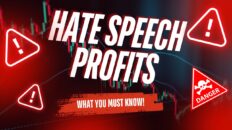Michael Green, Chief Strategist and Portfolio Manager at Simplify Asset Management, delivers a sharp warning about the risks of passive investing amid the growing economic uncertainty fueled by ongoing tariff tensions. Green emphasizes that investors should not underestimate the lasting market effects of trade policy volatility—particularly from the Trump-era tariffs, which he believes are still echoing across global capital markets.
“The volatility from Trump’s tariffs isn’t just noise — it’s a force reshaping global capital flows,” Green said, cautioning that investors are already seeing the early signs of how trade strategies can ripple through supply chains, corporate earnings, and equity valuations.
Green described the current economic climate as one where investors must be more discerning. While some view tariffs as short-term political maneuvering, Green considers them part of a larger, structural realignment that has both economic and geopolitical consequences.
He pointed specifically to the retaliatory risks posed by countries like China. In the case of Apple, for instance, Green warned that the Chinese Communist Party has already indicated that seizing foreign multinationals’ assets remains a possible lever of retaliation. “This is a form of economic warfare,” he said. “And companies with large supply chain exposure to China may be far more vulnerable than markets currently recognize.”
The Passive Investing Illusion
But tariffs were only part of Green’s concern. A major theme of the interview centered around the misunderstood role of passive investing — what Green describes as a systematic algorithm mistaken for a neutral strategy.
“You’re not a passive investor — you’re an active investor following a simple algorithm,” he said. “As more people invest passively, they’re creating the very market risks they think they’re avoiding.”
Green explained how the popularity of index funds and target-date strategies funnels a disproportionate amount of capital into the same handful of large-cap stocks — often regardless of valuation or fundamentals. This phenomenon, he argues, creates a feedback loop that drives concentration, inflates prices, and increases fragility in the system.
What Should Investors Do Now?
Despite the warnings, Green doesn’t suggest panic — he suggests being intentional. For retail investors who rely heavily on index funds, his advice is to step back and reassess portfolio construction.
“Most investors are positioned for what worked in the past, not what may work going forward,” Green said. “We’re in a different world now — geopolitically, economically, and demographically.”
He recommended exploring fixed income opportunities, particularly now that bond yields are at historically attractive levels. Green believes that investment-grade debt, municipal bonds, and money market funds offer relatively strong returns with far less risk than many overbought equities.
“If you can look at fixed income markets and say, ‘This meets my needs,’ then maybe you don’t need more equity exposure,” he advised. “Invest for what you need — not what your neighbor wants.”
A Time to Be Strategic
Ultimately, Green’s message is one of strategic adaptation. In a world defined by rising geopolitical tension, shifting supply chains, and the unintended consequences of algorithmic investing, the old rules no longer apply.
“The simple reality is that markets are changing,” he said. “And investors who continue to treat them like they haven’t — that’s where the real risk lies.”


